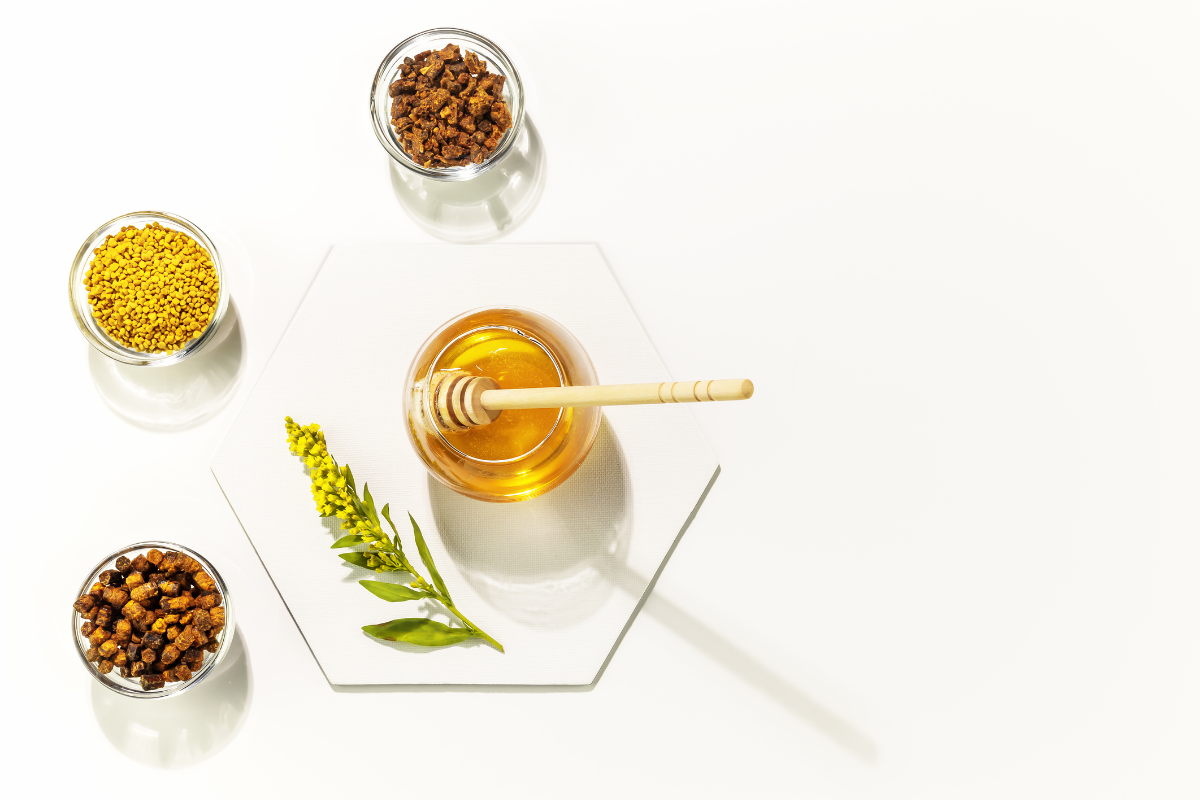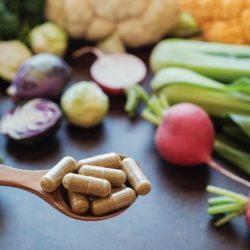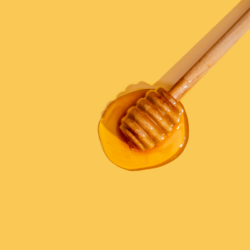Like precious royal jelly, propolis is a treasure from the hive, prized for its many virtues. Carefully prepared by worker bees, it is derived from resinous substances harvested from the buds and bark of trees. This rich, complex substance is renowned for its powerful energetic potential and its natural antibiotic properties, which are effective in treating wounds.
Also recognised for its healing and antiseptic qualities, propolis is used in certain French health establishments, which recognise and exploit its benefits to accelerate wound healing. Its richness in active components such as hydrogen peroxide, glucose oxidase and various enzymes gives propolis its remarkable therapeutic capabilities.
Incorporating propolis into your daily routine means boosting your immune defences naturally. It’s the ideal companion for coping with winter and its discomforts, allowing you to benefit from the very essence of bee vitality. Embrace the cold season with serenity by relying on this precious gift of nature.
The history of Propolis
The ancestral use of propolis dates back to ancient Egypt, where it was already prized for its remarkable antiseptic and preservative properties. The Egyptians discovered that this natural substance, harvested by bees from tree resin, had exceptional qualities for preserving food and fighting infection.
Ancient Egypt was a veritable melting pot of medicinal knowledge, and propolis was one of the treasures in their arsenal of natural remedies. They used it to embalm the dead, recognising its power of preservation, but also to treat wounds and infections. The antiseptic properties of propolis made it a precious element in ancient Egypt, where hygiene and medicine played a vital role.
The Greeks and Romans also inherited the use of propolis from the Egyptians. Hippocrates, the famous Greek physician considered to be the father of modern medicine, had already documented the benefits of propolis in his writings. He recommended it as a remedy for various ailments, including wounds, infections and ulcers.
The Romans included propolis in their pharmacopoeia, taking advantage of its healing properties to treat the wounds of their soldiers on the battlefield. The legacy of the use of propolis by these great civilisations has endured through the ages, and today it is still recognised and appreciated for its many virtues in the field of natural health.
Harvesting and processing Propolis
Propolis, a substance meticulously harvested by bees, undergoes a delicate transformation process to preserve its precious natural properties.
Propolis: Origin and harvesting
Propolis, this precious substance, is harvested by bees from tree resin. This natural process takes place at the heart of the hive, where the meticulous bees collect this resin for use in the construction of their habitat. This collection is crucial to maintaining the health of the colony, as it acts as a protective barrier against infection and bacteria.
Beekeepers play an essential role in this harvest, ensuring that it is sustainable. Their aim is to preserve the hive ecosystem while carefully harvesting the propolis. They extract only a moderate quantity to ensure that the bees always have a sufficient supply for their own use.
Propolis processing: preserving its natural qualities
After harvesting, comes the processing required to create various propolis-based products. This processing requires great delicacy in order to preserve the natural qualities of propolis. These qualities include particularly beneficial antioxidants and antimicrobial compounds.
Propolis is used in a variety of products, including food supplements, skin balms and oral care products. To preserve its natural healing properties, gentle methods such as cold extraction are preferred during processing.
What is the composition of Propolis?
Propolis has a rich and complex chemical composition, with each component playing a key role in its health benefits.
At the heart of this natural substance are :
- Resins and Balms: Making up almost 50% of propolis, these substances are collected by bees from tree buds and are the main source of propolis’ antimicrobial properties.
- Beeswax: Representing around 30% of the composition, beeswax gives propolis its consistency and makes it easier to apply.
- Volatile oils: These 10% give propolis its characteristic fragrance and contribute to its antiseptic properties.
- Pollen: At 5%, pollen enriches propolis with vitamins and trace elements.
- Organic Substances: These make up the remaining 5% and include :
-
- Flavonoids: These powerful antioxidants protect cells against oxidative damage.
- Phenolic acids: These give propolis its antiviral and anti-inflammatory properties.
- Terpenoids: Known for their anti-inflammatory effects.
- Aromatic acids: play a role in the antifungal and antibacterial activities of propolis.
- Vitamins and Minerals: Particularly B-group vitamins and minerals such as zinc, magnesium, calcium and iron, which are essential for many bodily functions.
In addition to these components, propolis also contains active elements that are fundamental to its effectiveness:
- Hydrogen Peroxide: Naturally antiseptic, it helps to defend the body against pathogens.
- Glucose Oxidase: This enzyme, produced by bees, plays a crucial role in the production of hydrogen peroxide from glucose, reinforcing the antimicrobial action of propolis.
- Various enzymes: These catalyse the biochemical reactions required for propolis’ many biological activities.
This composition makes propolis a concentrate of benefits, capable of supporting the immune system, protecting the body from external aggression and participating in healing. It is truly a choice ally for maintaining good health on a daily basis.
The best of propolis in your online organic pharmacy
Propolis is currently a natural remedy on sale in many health food shops. You can find it in different formats for a variety of uses. It is also used in cosmetics and alternative medicine to treat all kinds of illnesses.
During the cold season, make the most of the virtues of propolis. This extraordinary plant substance has many benefits. Soin et Nature offers a selection of products from the Propolis range for everyone’s well-being.
| Product | Description | Usage |
|---|---|---|
| Propolia Pure chewable | 100% pure French propolis, without impurities, presented in the form of chewable tablets. | Protects, purifies and soothes the oral cavity and respiratory tract. |
| Arkogélules Propolis Bio Arkopharma | Capsules containing organic propolis, a resin collected by bees from tree bark. | Used for their antiseptic and immune-boosting properties. |
| Soria Natural syrup | Syrup combining propolis and a complex of 17 plants, designed to soothe the throat. | Calms coughs, supports the immune system, and soothes tickling in the throat and tired vocal cords. |
| Ladrome Propolis Mouth Spray | Propolis-based mouth spray designed for sensitive throats. | Used to relieve sore throats and support the body’s natural defences, particularly in children. |
| Eric Favre Propolis Bio | Dietary supplement made with organic propolis, designed by the Eric Favre laboratory. | Boosts the immune system, particularly recommended during the change of season for its protective properties. |
| Herbalgem Propolis Bio | Single-dose organic propolis enriched with glycerol macerated buds. | Offers a concentrated solution to boost immunity, practical and easy to take everywhere. |
Each of these products exploits the intrinsic qualities of propolis to provide natural support for the body, whether to boost the immune system, soothe the throat or purify the oral cavity. The diversity of galenic forms (chewable tablets, capsules, syrups, sprays, single doses) means that they can be used to meet the specific needs of each individual.
Scientific research has led to a better understanding of the benefits of Propolis
Propolis, the precious product of the beehive, has long been recognised for its many health benefits. However, it is modern scientific research that is providing us with an in-depth, validated understanding of its properties. Let’s discover together how recent studies shed light on the therapeutic virtues of propolis.
Positive effects on the pro-oxidant-antioxidant balance
A study published in the prestigious journal Scientific Reports revealed the significant impact of propolis on the pro-oxidant-antioxidant balance, particularly in patients suffering from chronic kidney disease. This research shows that propolis could play a key role as a supplement in the treatment of these diseases, thanks to its unique antioxidant and anti-inflammatory properties.
Reduced cardiovascular risk in rheumatoid arthritis patients
In another remarkable study, researchers examined the effectiveness of propolis in reducing cardiovascular risk factors in women with rheumatoid arthritis. The results, from a rigorous clinical trial, showed significant improvements, highlighting the potential of propolis as a complementary treatment strategy for these patients.
Diabetes management
Propolis also shows promise in the management of diabetes. Studies have indicated that propolis may help regulate blood glucose levels, improving insulin sensitivity and reducing insulin resistance. Propolis has a property that makes it potentially beneficial for diabetics. It contributes to better glycaemic control and the management of associated complications.
A natural solution to counter the effects of ageing on cartilage?
Ageing is often accompanied by chronic low-grade inflammation, which plays a crucial role in various age-related diseases, including osteoarthritis. A recent study highlights the potential of propolis, a natural product known for its antioxidant and anti-inflammatory properties, as a therapeutic agent against age-related changes in cartilage.
This research looked at the effect of propolis on the articular cartilage of the knee in ageing rats. Twenty male Sprague-Dawley rats were divided into four groups: a group of young rats (control), a group of aged rats, a group of aged rats treated with an ethanolic extract of propolis (EEP) and a group of aged rats receiving a control vehicle. The results of this study are revealing: treatment with propolis significantly reduced the severity of osteoarthritis, improved the structural integrity of cartilage and increased the density of chondrocytes.
Implications and potential of this treasure from the hive
These promising results highlight the potential of propolis. It could be used as a therapeutic agent against age-related cartilage damage. This approach could also delay the onset of osteoarthritis. Three aspects support this efficacy: reduced chondrocyte depletion, improved cartilage structure and reduced severity of osteoarthritis. These indicators are encouraging for the use of propolis as a therapeutic intervention.
However, further research is needed to fully elucidate the mechanisms of action and safety profile of propolis treatment, paving the way for its potential application in the management of osteoarthritis and the promotion of healthy ageing.
A natural weapon against colorectal cancer?
A recent scientific study has revealed some fascinating information. It focuses on propolis, a natural product of beehives. This substance shows promising potential in the fight against colorectal cancer in its early stages. Colorectal cancer is one of the most common cancers. It is also a leading cause of cancer deaths worldwide. Led by Ming-Hung Shen and his team, the study explores the positive impact of propolis on the development of colorectal cancer.
In this research, mice were treated to develop early colorectal cancer and then some of them were given propolis. The results observed in the propolis-treated mice were impressive. The scientists observed a reduction in the size of the tumours and positive changes in their structure.
A positive influence on the immune system
One of the most promising results of the study concerns its impact on the immune system in colorectal cancer. The researchers found that propolis increased the number of certain beneficial immune cells, CD3 and CD4 TILs, while reducing FOXP3 lymphocytes, which are known to be less favourable in this context. This suggests that it could play a key role in boosting the immune response against cancer.
Potential to be explored further
This discovery opens up exciting prospects. Could this wonder of the hive, propolis, be used as a dietary supplement to prevent or slow the development of colorectal cancer? The study suggests yes, but it also highlights the need for further research. It is important to better understand exactly how propolis works and to confirm these results in humans.
References
- https://www.nature.com/articles/s41598-023-37033
- https://www.nature.com/articles/s41598-023-31254
- https://journals.plos.org/plosone/article/
- https://www.researchgate.net/publication/361873996_Propolis_Mitigates_RifampicinIsoniazid-induced_Lipid-redox_and_Metabolic_Profile
- https://www.ncbi.nlm.nih.gov/pmc/articles/PMC10648826/
- https://www.ncbi.nlm.nih.gov/pmc/articles/PMC10532056/







